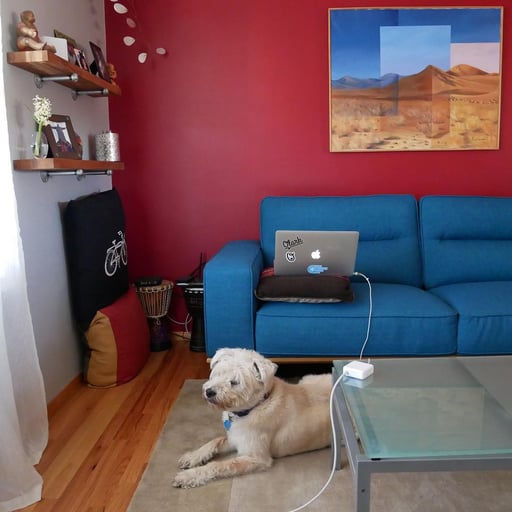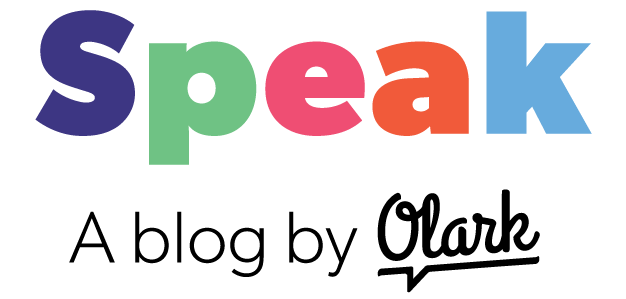At Olark, we love the benefits of remote work, but we also know that working remotely isn’t for everyone. Transitioning from an onsite role to a remote role can be a big adjustment. Here are five questions to ask yourself if you’re thinking about taking the #remotelife plunge.
Are you self directed?
Working remotely requires a lot of self discipline and motivation. It’s not possible to ‘look busy’ when working remotely, so your job performance will be judged primarily on your productivity. If you need an external motivator in order to be productive (a boss occasionally looking over your shoulder, for example) working remotely might not be the right choice for you.
A remote role can also come with personal distractions, especially if you’re working from home. Neighbors stopping by, finding something interesting on TV or online, your kids or pets demanding attention, dishes, laundry, etc. — the list of possible distractions is endless, and no one is going to be around to discourage you from giving in.
It’s important to be able to establish boundaries between work and personal time. Having a dedicated home office space can be really helpful with this, as can communicating clearly with others in your household that just because you’re home doesn’t mean you’re available. A lot of Olarkers have success using the Pomodoro Technique to build breaks into their workday.

Rhoda, Olark's Director of Customer Service, stays organized with a colorful bullet journal! Keeping track of daily tasks is especially important when working remotely.
Are you comfortable working alone?
Working remotely often means working alone. Even if you use a coworking space or coffee shop, the chance that one of your coworkers will be working with you in person is pretty low with fully remote teams.
At Olark we’ve found that a large number of us are introverts who thrive in private workspaces. We’ve also found that some of our extroverted teammates occasionally struggle with feelings of loneliness or isolation.
This doesn’t mean that extroverts won’t thrive working remotely — any personality type can succeed in a remote position -- but it does mean that extroverts need to make sure they can meet their in-person social needs through other activities like volunteering, belonging to clubs or teams, and regular get-togethers with friends. Fortunately, remote work usually lends itself to a more flexible schedule, so making time for social activities may be easier than it would be with an on-site role.
Are you an excellent communicator?
Working remotely requires excellent communication skills. As a remote employee, you’ll be relying on written communication much more heavily than you would in an office, and you’ll be less able to depend on things like tone and body language to convey your meaning. It’s important that you’re able develop your own voice in writing, and that you’re able to explain yourself clearly to your colleagues.
Knowing what tool to use is part of being an excellent remote communicator, as well. At Olark, we rely on a lot of tools to communicate effectively with each other: Slack for chatting, Zoom calls for 1:1 or group discussions that require face to face interaction, Trello, JIRA, Google Docs and Google calendar to stay organized, and Gmail for issues that don’t require an immediate response. We all think about the right tool to use before initiating a conversation, and we know when to switch tools — e.g., when a conversation becomes too complicated for Slack, we know to go ahead and get everyone on a quick Zoom.
Are you capable of maintaining a healthy work/life balance?
Working from home means living where you work, which can make it more difficult to maintain a healthy work/life balance — especially if you tend towards workaholism. It’s really easy to check emails, perform a quick fix on an issue, or work on a project after-hours when your job is always at your fingertips. Burnout is no joke, so it’s important to establish and maintain healthy work/life boundaries if you want to succeed working remotely.
One way to do this is to create an office space that you use only for work. This could be a room or area in your house where you’re able to focus during the work day and leave when work’s over. If there’s a door you can close and not open again until work starts the next day, even better.
Some people find that renting a coworking space is more helpful than a home office space when it comes to work/life balance — it offers the structure of an office without having to be in the same physical location as your company. Coworking spaces often offer access to friendly communities of professionals as well, so networking is another great benefit of these spaces!

Hector, Olark's Appstronomer, has a comfy and stylish remote workspace - complete with a furry friend! Having a dedicated workspace can help maintain a healthy work/life balance.
Does your employer offer a healthy remote culture?
Not all remote jobs are created equal. Finding a team with a healthy remote culture is vital to being a successful remote worker.
Here are a couple of red flags for toxic remote culture:
- Not offering a fair market salary for your position. Companies shouldn’t use remote work as a justification to pay their employees less.
- Treating remote workers as lesser-than or isolated from the rest of the company, especially if the company offers some onsite roles. You should feel as valued as an onsite employee and you should be given opportunities to meet your colleagues in person at least once a year.
Some examples of healthy remote culture:
- Your team follows a set routine and structure. For example, team syncs happen at a time that works for everyone and follow a set pattern. Everyone is able to stay on the same page and knows what to expect from these meetings.
- You’re given opportunities to meet colleagues in person (e.g., at an annual retreat or occasional get-togethers with other employees in your city).
- The company makes space for employees to foster connections remotely. Olark has a number of fun Slack channels that are just for hanging out, directed at a wide variety of interests. If you’re a maker, chat about things you’re currently working on in #hack-shack. If you want to spam pictures of your pets, join #cute-overlord!
- Your company is invested in your professional development. You should be able to grow and progress in your career at the same rate as you would in an onsite role. That means opportunities to grow your skills and access to mentors.
Do you think remote work is right for you? If it is, give it a shot! If you’re looking for remote opportunities, check out We Work Remotely.
If you’re currently a remote worker, what attracted you to remote work? Is there anything we missed for people considering working remotely? Leave us a comment and let us know :)

